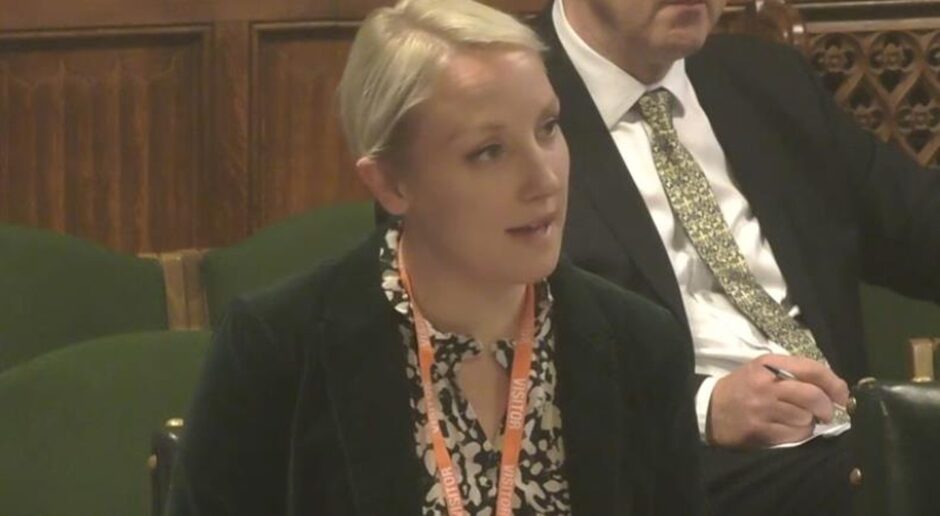
A committee hearing to discuss the future of the government’s flagship energy company GB Energy in Aberdeen on Wednesday emphasised the need for UK and Scottish governments to work together in the transition to net zero.
At the Scottish Affairs Committee hearing, Emma Pinchbeck, chief executive of the Climate Change Committee (CCC), stressed the need for collaboration on climate goals and admitted she is “frustrated” communities are so far failing to feel the benefit of energy transition.
“There’s an understanding in Westminster that we need to work with Scotland to deliver some of the key things in the government’s policy agenda but also in climate targets more broadly,” she told the hearing.
Pinchbeck said the Scottish government will need to increasingly collaborate with regulators and strategic institutions in the UK, such as the National Energy System Operator (NESO).
She warned that the planning process for energy infrastructure is “outdated” across both Scotland and the UK.
Owen Bellamy, who is head of energy supply decarbonisation and resilience at the climate committee, said that the Scottish electricity system, where more electricity is generated than consumed, is not “completely separate” from the rest of the UK.
They raised the need for different energy sectors to work together, for example on offshore site leasing and consenting, which is important for both the offshore wind and oil and gas sectors.
“In our view as the committee for net zero overall, the economy in terms of GDP and growth is better under a net zero trajectory than an economy that is still dependent on fossil fuels,” Pinchbeck said.
“That’s for a couple of reasons. One, the energy transition is gathering pace globally so electrification technologies, in particular, and renewables, are looking set to be a very dominant fuel in the future energy system.”
However, Richard Hardy, commissioner for the Just Transition Commission, argued that not enough is being done to facilitate a so-called ‘just transition’ that provides for workers in existing industries.
“Our advice to the Scottish government is that if you keep doing things the same way that you are doing things, you won’t deliver a just transition,” he said. “So things need to change.”
‘Frustrated’ at lack of progress
Pinchbeck also said the CCC is “frustrated” at the lack of progress towards cheaper electricity, citing communities impacted by the energy transition in industries such as oil and gas in Aberdeen.
She said: “We have also said cheap electricity is absolutely necessary and we are frustrated at the lack of progress on this.”
Local communities in Scotland are expected to benefit from the move to cleaner energy.
“We know that building out the system, locating infrastructure where it’s most efficient, moving it around the country to where there is high demand, the UK-wide energy system overall benefits from this move to renewables and building them in efficient places,” Pinchbeck said.
“Consumers benefit from being able to use cheaper electricity in their homes — we can see that in the overall model.”
Pinchbeck warned however that energy savings are not being passed on quickly enough from energy suppliers to consumers.
“Cheap electricity is low bills for people…,” she said. “We’re in a world where we’re building a large amount of electricity infrastructure, and telling people completely accurately that it is the cheapest form of power and then people are not experiencing that on their bills, and there is a need to accelerate that.”
She highlighted a need for “balance between investing in jobs and local industries, and manufacturing, and cheap market mechanisms overall” as well as local communities.
The CCC “recognise the Scottish government consultation on community benefits, we recognise that the UK government has previously consulted on it, and I think we see the challenge”, she added.
Don’t get ‘left behind’
Not every community has adapted to changes in energy infrastructure easily. Pinchbeck referenced the Great Grid upgrade in the 1960s where there was “pushback” from local communities in England about pylons moving energy to Wales.
“We have a similar issue where we’re building infrastructure in communities that haven’t seen it before and we’re moving power round the country,” said Pinchbeck, who said this was addressed through a communications programme about the benefits.
“The committee does have a view that government should be doing far more of that.”
Hardy stressed that not every country gets the energy transition right, highlighting Ireland “got it wrong when they shut Bord na Mona”, a peat harvesting and energy company that closed in 2023.
Pinchbeck warned about not getting “left behind” in the energy transition on the international stage.
A network of 25 other climate change committees in the international climate change network, with Germany and Ireland on a “similar trajectory” to the UK, and other countries such as South Africa further ahead.
“We’ve yet to see what the new Trump administration means for actually on the ground delivery of the Inflation Reduction Act in the US but that moved a lot of private capital over to the US into energy industries over there,” Pinchbeck said.
Over 130 countries have pledged to triple global renewable energy capacity by 2030 – that was done at COP 28, she said.
“There’s just this huge move towards the energy transition, and I think the overall message on this is we’re in a very good place with our climate governance,” she said.
“Overall the world is moving very quickly in this direction… and I think the main message is not to get left behind.”
Recommended for you

